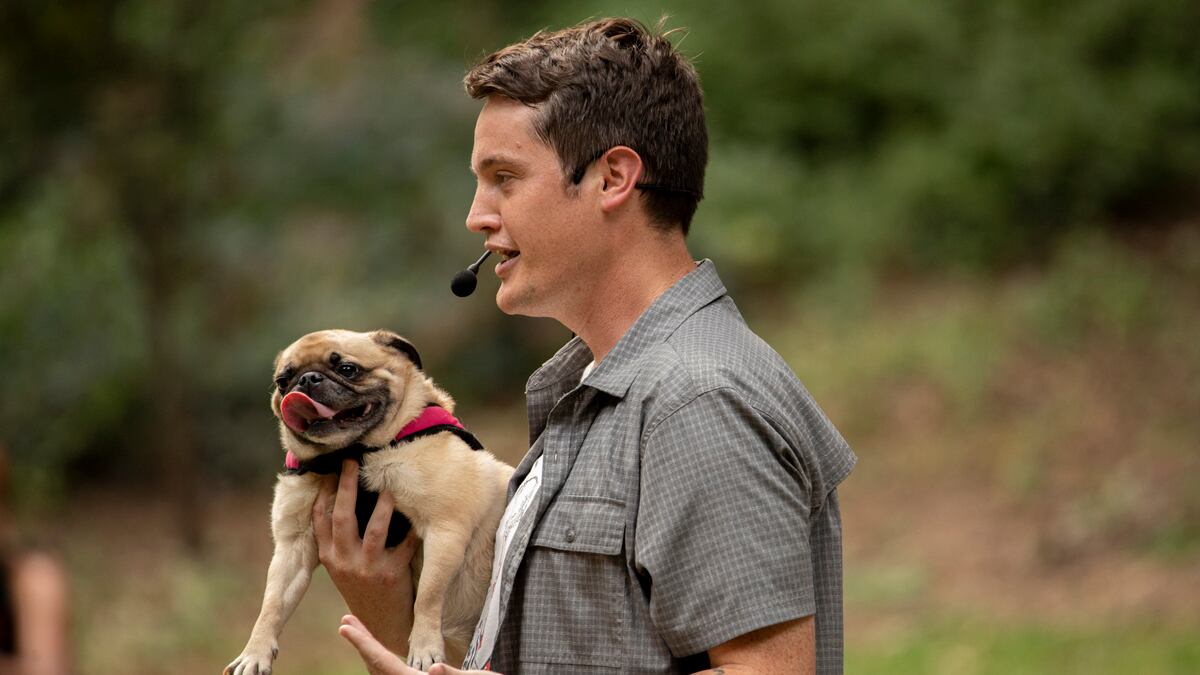Over the summer, Kickstand Comedy did with comedy shows what most Portlanders have done with their social interactions for the past 16 months: It took them outside.
The result was that Kickstand’s Comedy in the Park became an improbable, knockout success.
Going outside removed the public health fear factor from live performance, says Kickstand artistic director Dylan Reiff. He describes the experience in near-therapeutic terms—for audiences and performers alike.
“Having a live show again and just being able to do what you know you’re really good at is just medicine,” he says. “It’s that good medicine.”
It’s also catching. The series started with about 75 people in attendance, says Reiff, and grew to attract audiences in the hundreds as well as drop-in visits by standups from all over the country—most recently beardy, gruff Kyle Kinane, patron saint of elder millennials who live alone.
The series’ success shouldn’t be a surprise to anyone who’s been paying attention to Kickstand. Like a comedy cuttlefish, the organization has demonstrated an unkillable ability to adapt to less than ideal conditions since its inception in 2014. Kickstand held its first shows in a tiny, black-painted basement beneath bike shop Velo Cult. Upstairs, you could grab a cider at the bar. Downstairs, you could see some of the city’s weirdest, most endearing standups and improvisers doing what they did best, in a venue whose strange, scrappy hospitality has never quite been matched.
It was a combination too perfect to last: The city shut down the original Kickstand over permitting issues and egress concerns.
But Reiff and his co-founders are actual improvisers. They persisted. They found a similarly quirky space—an attic—above the Siren Theater and, in 2019, a forever home in the former Brody Theater.
They even renovated, but no one’s yet seen the new interior. Just over two weeks after the space’s overhaul began, Gov. Kate Brown issued a stay-home order for the entire state, sending live performance venues scrambling.
“It’s kind of whiplash,” Reiff says.
But scrambling is arguably what Kickstand does best. The organization acted quickly, shutting down before Brown’s order even took effect.
“We just didn’t want to take any chances,” Reiff says. Even when the possibility of reopening came up, he said, “we knew our community was not feeling very good about live, in-person shows, and it was really important to us as well that we didn’t yo-yo between opening up with the new guidelines and then closing three weeks later”—a massively inconvenient back-and-forth that became all too common among other businesses and venues during the pandemic.
For comedy, online performance was one possibility. “We did a lot of backflips” shifting to that, says Reiff, but it’s “essentially a brand-new medium” and one that requires its own particular expertise.
“We really were trying to think of the most effective or dummy-proof…way to make and create, and we landed on trying to find an outdoor venue,” he says.
But securing outdoor space that isn’t cost-prohibitive is challenging, which led Reiff to consider “a church parking lot or whoever would listen to me that would be interested in collaborating and helping us to keep some form of live comedy going in Portland that felt safe.”
No church parking lots were necessary. Portland Parks & Recreation bought in, and Kickstand held its first Comedy in the Park show in Laurelhurst Park with a lineup of local standups in late May. As the free comedy series continued through the summer, the audience for it grew up the hill like socially distanced invasive ivy.
“It was very, very needed,” says Reiff. “We just needed to feel—'normal’ is no longer a word we’re really going to probably use anymore—but it was great to feel like we were doing the thing we’re passionate about again.”
As the Delta variant once again puts arts organizations on a terrible, roller-coaster trajectory between reopening and shuttering, Reiff says, Kickstand hoped to continue outdoor programming into fall and winter, with an outdoor stage that could be covered and heated. Given the uncertainty, outdoor performance still seemed like the surest bet for keeping live comedy safe and in compliance with public health guidance.
Pandemic or no pandemic, there’s demand for it. Standups feel rusty and audiences feel hungry for comedy, says Reiff. Kickstand is prepared to address both needs, hewing to the same mission the space has had since its first off-kilter opening: cultivating performers and an audience for them through a safe and inclusive pedagogy that makes creative risk-taking possible.
“You have to be able to fail,” says Reiff, echoing a sentiment he shared years ago when Kickstand had just opened. “You have to be able to try things out.”
Even amid the “Wild West” of the pandemic, he says he’s looking forward to what the coming months could bring for Portlanders who need to laugh right now. “I mean, it’s weird to say that I feel hopeful in 2021, but there is a lot of hope,” he says.
Reiff is specifically mindful of standups and improvisers who have stepped back from the art form amid the pandemic, who may have a lot to say when they get back onstage.
“We all need to take breaks, but when it comes back…I just think we’re going to see a slate of some really cool stuff in the next couple years,” he says. “I think that people have had a lot of time to incubate their ideas and thoughts, and even if they’re not working on them yet, they’re going to pretty soon, and we want to just be a place where that can happen.”
GO: Laurelhurst Park, Southeast César E. Chávez Boulevard and Stark Street, near Concert Grove. 6:30 pm Friday, Sept. 10. Free. See kickstandcomedy.org/laurelhurst for more information.
